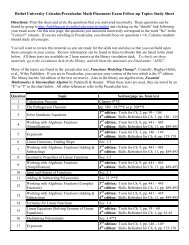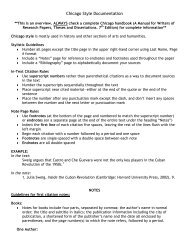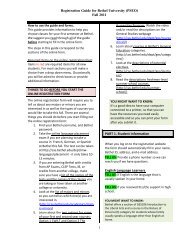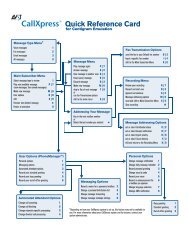here - College of Arts & Sciences - Bethel University
here - College of Arts & Sciences - Bethel University
here - College of Arts & Sciences - Bethel University
Create successful ePaper yourself
Turn your PDF publications into a flip-book with our unique Google optimized e-Paper software.
The primary thing I look for when judging a debate is <strong>of</strong>fense. The government has the<br />
advantage <strong>here</strong> in that their <strong>of</strong>fense is usually their case. The opposition must not only<br />
disprove the government case (since it is hard to disprove any case 100%), they must also<br />
provide an <strong>of</strong>fensive reason to vote for the opposition. This <strong>of</strong>fense can come in many<br />
forms – disadvantages, counterplans, critiques, or opposition cases (in resolutions <strong>of</strong> fact<br />
or value).<br />
Another general comment would be to use rebuttals strategically to highlight the reasons<br />
you want to see on the ballot for your win. T<strong>here</strong> is no reason in the last rebuttal that you<br />
need to extend every argument made in the round – that defeats the point <strong>of</strong> the rebuttal.<br />
Choose the arguments that you are winning and minimize the arguments that you are<br />
losing in a manner that allows you to give the debate a sense <strong>of</strong> conclusion. Finally, I’m<br />
not a huge fan <strong>of</strong> the race to magnitude. I prefer that teams evaluate and compare their<br />
arguments on risk, probability and magnitude.<br />
Procedurals – I think procedurals (topicality, vagueness, spec) are crucial tools that allow<br />
the opposition to challenge abusive government interpretations. However, I have pretty<br />
high standards for how these are argued; the opposition needs to provide a counterdefinition<br />
or interpretation and explain why this establishes a better standard for the<br />
debate. Voting issues, like all things in debate, are not a given – you must impact your<br />
arguments, even topicality.<br />
Value/Criteria – Even though I come from a policy background, I think that value and<br />
criteria are greatly underutilized by most debaters. They provide an excellent way to<br />
exclude the other side’s impacts and focus the debate on your ground. The also are<br />
immensely helpful to the judge; without some value hierarchy, how do I compare war to<br />
economic recession to losses <strong>of</strong> liberty without intervening based on my own value<br />
hierarchy. The criteria <strong>of</strong> net benefits without a sense <strong>of</strong> what is important is meaningless<br />
to me.<br />
Resolution Analysis – I think the government has the burden to explain and justify their<br />
interpretation <strong>of</strong> the resolution. This helps clarify the debate from the beginning and<br />
prevents debates in which both sides are making arguments that don’t really contradict<br />
each other. In the case <strong>of</strong> something other than a policy debate, governments should spell<br />
out gov and opp burdens also make the debate clearer for the opp and the judge.<br />
Impacts – Every argument needs to be impacted in a way that explains its relation to the<br />
overall debate. This is w<strong>here</strong> value and criteria can be helpful in highlighting the most<br />
important substantive impacts. Impacts, however, are also crucial in procedural<br />
arguments – i.e. why is the gov interpretation or opp counter-interpretation bad for this<br />
debate At the end <strong>of</strong> each argument, you should answer the following question: why is<br />
this important If you do that, it will stop you from making irrelevant arguments and<br />
clarify the debate for both sides.<br />
Clash – The complement to impacts is clash. If one side does not engage the other side’s<br />
arguments, then it becomes very difficult for the judge to make a decision. More than just<br />
the appearance <strong>of</strong> clash, however, is necessary. Each argument should evolve throughout<br />
163
















